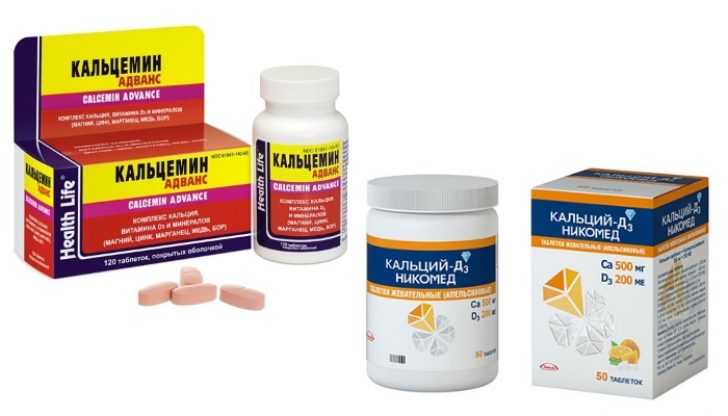Many parents have heard that children need calcium for the full formation of the skeleton and the growth of bones and teeth. However, the role of this mineral is not limited only to the skeletal system, therefore, the intake of this element into the child's body with food or additional compounds, as prescribed by a doctor, must be strictly monitored.
Why does a child need calcium?
In addition to forming the skeleton and giving it strength, calcium is part of many enzyme systems and various processes, due to it various bodily reactions are carried out. So, calcium ions help:

Sufficient intake of calcium, along with, has anti-stress, anti-allergic and anti-inflammatory effects. It is prescribed in children with acute blood loss, the presence and presence, and many other conditions. It is important to ensure that the baby gets enough calcium from the diet, starting from an early age. This is important so that rickets and problems with nervous excitability do not form. But calcium can only be absorbed in conjunction with what comes with food, otherwise its absorption will be impaired.
There are certain norms of calcium, which must come from food and drink, as well as additional drugs. From birth to six months, a child needs about 400 mg of calcium, from six months to a year, up to 600 mg is needed, at the age of one to 10 years, it needs up to 800 mg, after 10 years, about 1000-1200 mg.
In situations where the child's body suffers from calcium deficiency, various health problems are formed - these are significant lags in growth and weight indicators, as well as inhibition of psycho-emotional development. If this is an early age - the first two years of life, calcium deficiency (usually in combination with) leads to the formation of metabolic pathology - which, without treatment, threatens with skeletal deformities, problems with digestion, growth and development, and the functioning of the nervous system. If these are older children, along with skeletal problems, hair and nail growth suffers, stoop and other posture problems, dental pathologies and muscle dystonia, metabolic disorders and other problems arise.
The appointment of calcium supplements should be strictly justified by the doctor, since an excess of calcium can damage the body tissues by the kidneys, forming calcifications. In addition, calcium salts are often difficult to digest, affect digestion and threaten constipation. It is important to replenish calcium reserves only through nutrition, and drugs are prescribed for various pathologies and with a pronounced deficiency of the mineral.
Attention to calcium preparations
Calcium deficiency can form from an early age, if even in utero the baby received a little calcium through the placenta or after birth did not receive breast milk and calcium along with it. From milk mixtures, and even more so from non-adapted complementary foods, calcium is absorbed much worse.
note
When calcium supplements are needed, doctors usually recommend over-the-counter complex-acting drugs for children - this is a combination of calcium with vitamins that improve its absorption. But in some cases, calcium preparations can be recommended as a treatment in combination with modern forms.
It is important to take into account certain factors and the composition of drugs that can be classified according to several criteria:

When using each of the drugs, it is important to determine in the composition the exact amount of calcium needed by age. This is due to the fact that an overdose of ionized calcium can also result in negative consequences for the health of the baby. In addition, it is important to determine strict indications for taking drugs, without the permission of a doctor, it is forbidden to use any means, especially in young children.
Taking calcium supplements by children: features
The intake of calcium preparations by children has its own characteristics, which depend on age. However, physically the intestines of a baby at any age cannot absorb more than 600 mg of calcium at a single dose of the drug. Therefore, it is important to remember such nuances when prescribing prophylactic calcium intake or its therapeutic dosages. It is important to make a single dose physiological, while changing the daily dosage - to break the intake of calcium into several parts.
note
Excess calcium, received in the form of drugs, is simply not absorbed in the intestines and will be released unchanged with the stool, and if calcium is administered intravenously, its excess is removed in the urine.
 In the presence of special indications, when it is necessary to take high doses of calcium (which, fortunately, is rare in children), it is necessary to break the daily amount of calcium into several doses for full absorption.
In the presence of special indications, when it is necessary to take high doses of calcium (which, fortunately, is rare in children), it is necessary to break the daily amount of calcium into several doses for full absorption.
Also, many researchers advise paying attention to the time when calcium supplements are taken - due to the daily rhythms of the absorption of certain substances, calcium absorption also changes. According to scientists, the maximum absorption of calcium occurs at night, and this is especially important for the growth of the skeleton and the strengthening of tooth enamel. At night, the release is activated, which affects the absorption, including calcium, and the formation of bone tissue.
If calcium preparations need to be used repeatedly per day, it is worth doing this between main meals - between breakfasts and lunches, or afternoon snacks and dinners. If possible, such drugs should be recorded with citrus juices, which contain citrates, which improve the absorption of calcium in the body. If these are drugs in the form of calcium gluconate, they should be washed down with clean non-carbonated water or milk.
Calcium can compete with other minerals for absorption. This is especially important for iron. Calcium intake should be separated in time by at least 3-4 hours, otherwise the drugs simply will not be absorbed and will not have an effect. Therefore, calcium preparations should be taken in the afternoon, and iron-containing preparations in the morning.
In pediatric practice today, injectable forms of calcium preparations are practically not used to help eliminate calcium deficiency. Such funds can only be used for emergency care as a result of bleeding, convulsions or an acute allergic reaction.
Of the most common intravenous forms, calcium chloride and calcium gluconate are applicable. They are administered, if necessary, strictly intravenously, their subcutaneous or intramuscular administration is prohibited, they lead to tissue necrosis and the formation of scars and lesions. Babies are recommended only oral forms of preparations with calcium.
Who is contraindicated, what side effects are possible
 Although calcium preparations are classified as relatively safe in pediatric practice and well tolerated, however, individual sensitivity reactions, side effects and contraindications to its use are not excluded. Calcium compounds, although relatively insignificant, can sometimes affect the digestive tract, which threatens the development of constipation or bloating, less often diarrhea and pain. A combination of calcium preparations with citrates will help reduce the likelihood of such effects, but often allergic reactions on the skin form in this combination in babies. In addition, there are a number of contraindications to taking calcium supplements in childhood, although it is quite small. These include:
Although calcium preparations are classified as relatively safe in pediatric practice and well tolerated, however, individual sensitivity reactions, side effects and contraindications to its use are not excluded. Calcium compounds, although relatively insignificant, can sometimes affect the digestive tract, which threatens the development of constipation or bloating, less often diarrhea and pain. A combination of calcium preparations with citrates will help reduce the likelihood of such effects, but often allergic reactions on the skin form in this combination in babies. In addition, there are a number of contraindications to taking calcium supplements in childhood, although it is quite small. These include:
- allergic reactions to the constituent components of the drug (usually not to calcium itself, but to additives)
- detected (high plasma calcium concentration)
- (increased work of the parathyroid glands)
- the presence of kidney pathologies and their insufficiency
- neoplasms of the body
- Availability .
Often, caution regarding treatment with calcium preparations is shown if the child has (the appearance of calcium salts in the urine), which may indicate a violation of metabolic processes and a tendency to.
Choice of calcium preparations in children
The appointment of calcium preparations and their selection, the form of administration and dosage are determined only by a doctor, taking into account possible contraindications and allergies, as well as assessing the bioavailability of drugs and possible negative effects from taking them. Apply:
calcium chloride containing 27% calcium. It is produced in ampoules and vials with a 5% or 10% solution. It is highly soluble in water, taken orally and absorbed by the intestines on average 30% of the administered dose. It tends to irritate digestion, leading to heartburn and abdominal pain; it is used extremely rarely in children (for resuscitation and therapeutic purposes).
calcium gluconate in tablets, has good solubility in water, does not irritate the intestinal wall, is used in pregnant women and children, is well tolerated.
calcium lactate contains 13% calcium, is used in tablets, dissolves slowly in water, does not irritate the digestive wall.
calcium carbonate contains 40% calcium, is available in tablets, is poorly soluble in water, dissolves in hydrochloric acid of the stomach, giving reactions with the formation of calcium chloride and carbon dioxide. Due to this, it irritates the digestive system, leading to belching, stomach pain and flatulence, reduces the acidity of the stomach, being an antacid, prolonged use of such a drug can significantly harm, due to than in children such drugs are not applicable. The absorption of calcium from such a preparation is insignificant due to the low acidity of the stomach in babies initially, which makes it difficult to dissolve and absorb.
calcium citrate contains up to 25% calcium in tablets, is well absorbed by the body, and is highly soluble in water; for full absorption, the presence of hydrochloric acid in the stomach is necessary. Due to citric acid, it is actively absorbed by the intestinal wall without irritating it, and also reduces the likelihood of the formation of calcium salts in the kidneys. Due to citric acid, the synthesis of parathyroid hormone, which leaches calcium from the bones, is suppressed. For use in children, there are forms of calcium citrate in combination with vitamin D3, which enhances the absorption of calcium.
calcium chelate (an organic compound of calcium with aspartic acid), obtained using special modern technologies. Absorbed from the intestine by almost 100%, without the participation of additional proteins and vitamin D3, does not irritate digestion and does not lead to stone formation in the gallbladder and kidneys. As a drug in Russia today it is not registered, has not yet been thoroughly studied, it is applicable as a dietary supplement to food. In children, take with caution due to the fact that there are no reliable studies and data on its potential safety.
Complexes with calcium for children
In addition to monopreparations, there are also complex preparations with calcium in the composition, which are applicable in children. Usually this is vitamin D3, which helps in the absorption of calcium, as well as some other vitamins and compounds.
Calcium-D3 Nycomed - a drug in tablets containing calcium carbonate and vitamin D3. Assimilation is low due to the fact that calcium is contained in a complex form.
Complivit-Calcium D3, intended for babies - has a similar composition to the previous one, has the form of a powder, by diluting which a suspension is obtained. For children from three years old, there is also a tablet form of the drug.
Calcid - a preparation created on the basis of eggshells (it also contains calcium carbonate) supplemented with a complex with a group of vitamins - all fat-soluble, supplemented with B vitamins (thiamine, riboflavin, cyanocobalamin, PP and B2). Used in children from the age of three.
Kaltsinova - a preparation with calcium in the form of a hydrophosphate dihydrate compound, in combination with ascorbic acid, pyridoxine and vitamins A and D. Applicable after three years.
Calcemin - contains calcium in combination with citrate and carbonate, supplemented with vitamin D3, minerals - copper, zinc and manganese, boron. Suitable for children from 5 years of age.
Vitamins-Calcium plus - chewing gummies with calcium in combination with citric acid, as well as vitamin D3 and phosphorus. Used in children from 3 years.
All other calcium preparations are used in children over 12 years of age according to the instructions, as well as for adult patients.
All calcium preparations can be used only as directed by a doctor in order to prevent overdose. It is dangerous with damage to the kidneys and gallbladder, digestive disorders and calcifications in the tissues.
Folk recipes and dietary supplements
You can hear advice that you can replenish calcium in children with eggshells, coral calcium and various dietary supplements with calcium based on these compounds. But is it worth it?
Secondly, the composition of calcium in the shell (as well as in the composition of coral stones) is hardly soluble carbonates, which cannot be absorbed in the intestines. Even crushed into powder, they will not bring any benefit, since the absorption of calcium from them is insignificant. Given the reduced level of gastric hydrochloric acid, such compounds will pass through the intestines in transit, without bringing any effect in the treatment.
Alena Paretskaya, pediatrician, medical commentator


